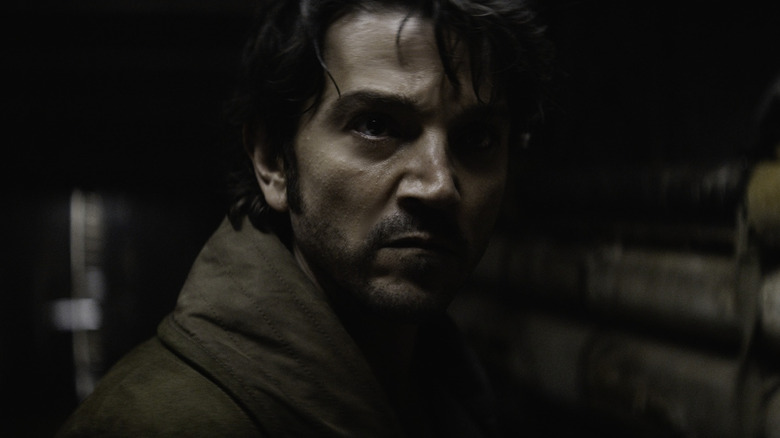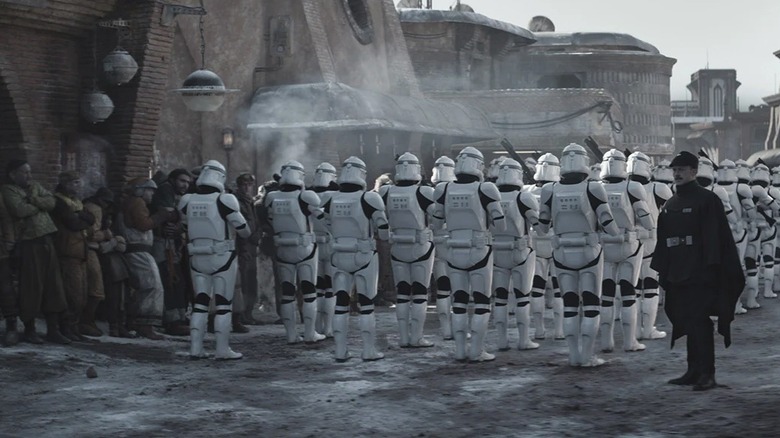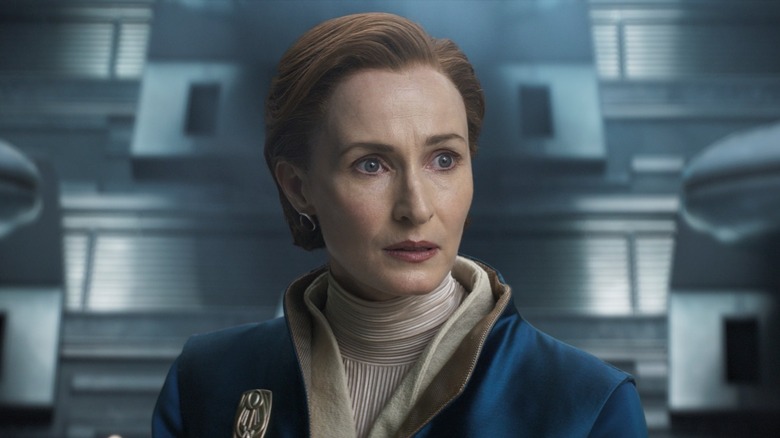Tony Gilroy Has No Clue What Genre Andor Is
Time and time again, fans eventually return to one of cinema's most classic debates. What genre is "Star Wars?" Most people's answer would be science fiction, and from a purely visual standpoint, they'd be right. However, when it comes to genre tropes and storytelling modes, "Star Wars" shares way more with fantasy than it does with sci-fi. There's a traditional hero's journey and a "chosen one" narrative, a mystical connective force of nature that binds the entire universe together, and it all takes place in the ancient past rather than the future.
Here's the proper answer: "Star Wars" is something else entirely. It's a space opera, which is a subgenre of science fiction that blends the vastness of space with the familiarity of human melodrama and fantastical elements. It's less about predicting the future or confronting moral dilemmas, as it is about using futuristic aesthetics as a base for escapism and allegory. This is true for most of "Star Wars," but finally, the franchise has evolved.
Last November, RollingStone took the debate one step further in an interview with "Andor" showrunner Tony Gilroy. If most of "Star Wars" (excluding "Rogue One: A Star Wars Story") is considered a space opera, then what genre is Gilroy's subversive spin-off series?
Of course, Tony Gilroy had a classic "Tony Gilroy" answer to the question: no clue, and it just wasn't relevant. "I'm just naturally disruptive, in a positive way. Every time I look at a scene or a character or a line, everything about me wants to turn it upside down," Gilroy said. "I don't wanna do what I did before. How can I make it different? What can we do? So my starting point is always that."
Genre is never on Tony Gilroy's mind
"Andor" exists as a black sheep, as it was arguably much more a Gilroy project than it was following the mold of recent franchise habits and trends. Ironically enough, one of the biggest selling points of "Andor" as a show is the fact that its showrunner doesn't have any nostalgia for "Star Wars" as a brand.
Gilroy, who notoriously was brought on as a script doctor for "Rogue One," was approached by Lucasfilm with the explicit goal of making something new. "I obviously didn't come with a huge 'Star Wars' resume. It wasn't my go-to Friday night. I'm not beholden to a lot of other things," Gilroy admitted to RollingStone. "You don't bring me in unless you know what I'm gonna do — and I gave them a good idea of what I was gonna do. So the mandate was to do something completely different."
Despite being known as the mind behind the "Jason Bourne" franchise, Gilroy claims that strict genre boundaries are not on his mind when he starts new projects. As a creative, he hopes to eventually land on the tone and feel of his work naturally:
"I didn't really think of a genre. I knew [why] they were hiring me: 'Oh, it's a spy thing. A guy who did 'Bourne' movies. He's gonna be a spy guy.' People know that I can write action, so they knew that there would be action and things like that. We'll take care of all that stuff and we'll do it in an original, cool way, but they don't really know what they're asking for, and at the beginning I don't really know what I'm trying to get."
Star Wars is defined by a mix of genre elements
The bad news — if you need closure from the man himself — is that Tony Gilroy still doesn't quite have an answer as to what genre "Andor" is. He explained:
"This is about the history of a revolution. This is a five-year period that leads to this titanic thing. My God, what an incredibly fascinating tapestry to pull together, if you could find a way into this that they would let you make. [...] So no, I didn't have a name for the genre other than, 'Wow. The first season is like 700 pages [of script]. What is that?' I never have grand plans. I always start small and build out. And I don't know! Where are we now? What is our genre now? I don't know how it would be described."
If you ask me, Gilroy's years of writing on "Bourne" shine through on "Andor," which feels like a proper espionage drama/thriller. Only instead of our real-world government, it's set amongst the rustic, dystopian backdrop of the "Star Wars" universe. George Lucas' brainchild has never been a stranger to political allegory, but the way "Andor" went deeper into the nuances of the Empire's systemic oppression and the Rebellion's morally gray origins in a way that feels rare not just for "Star Wars," but for any big IP owned by a mega-corporation.
The second season of the show is set for a 2024 release, so we won't be seeing Cassian Andor grace our screens for quite a long time. However, we can rest easy that Tony Gilroy's irreverent brilliance will still be present in season 2, as he continues his role as the main showrunner of the series.
"Andor" season 1 is currently streaming on Disney+.


